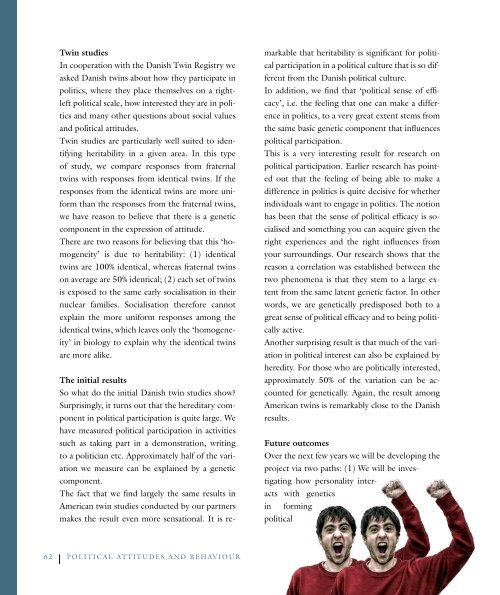Home to the skylark - The Velux Foundations
Home to the skylark - The Velux Foundations
Home to the skylark - The Velux Foundations
Create successful ePaper yourself
Turn your PDF publications into a flip-book with our unique Google optimized e-Paper software.
Twin studies<br />
In cooperation with <strong>the</strong> Danish Twin Registry we<br />
asked Danish twins about how <strong>the</strong>y participate in<br />
politics, where <strong>the</strong>y place <strong>the</strong>mselves on a right-<br />
left political scale, how interested <strong>the</strong>y are in poli-<br />
tics and many o<strong>the</strong>r questions about social values<br />
and political attitudes.<br />
Twin studies are particularly well suited <strong>to</strong> iden-<br />
tifying heritability in a given area. In this type<br />
of study, we compare responses from fraternal<br />
twins with responses from identical twins. If <strong>the</strong><br />
responses from <strong>the</strong> identical twins are more uni-<br />
form than <strong>the</strong> responses from <strong>the</strong> fraternal twins,<br />
we have reason <strong>to</strong> believe that <strong>the</strong>re is a genetic<br />
component in <strong>the</strong> expression of attitude.<br />
<strong>The</strong>re are two reasons for believing that this ‘ho-<br />
mogeneity’ is due <strong>to</strong> heritability: (1) identical<br />
twins are 100% identical, whereas fraternal twins<br />
on average are 50% identical; (2) each set of twins<br />
is exposed <strong>to</strong> <strong>the</strong> same early socialisation in <strong>the</strong>ir<br />
nuclear families. Socialisation <strong>the</strong>refore cannot<br />
explain <strong>the</strong> more uniform responses among <strong>the</strong><br />
identical twins, which leaves only <strong>the</strong> ‘homogene-<br />
ity’ in biology <strong>to</strong> explain why <strong>the</strong> identical twins<br />
are more alike.<br />
<strong>The</strong> initial results<br />
So what do <strong>the</strong> initial Danish twin studies show?<br />
Surprisingly, it turns out that <strong>the</strong> hereditary com-<br />
ponent in political participation is quite large. We<br />
have measured political participation in activities<br />
such as taking part in a demonstration, writing<br />
<strong>to</strong> a politician etc. Approximately half of <strong>the</strong> vari-<br />
ation we measure can be explained by a genetic<br />
component.<br />
<strong>The</strong> fact that we find largely <strong>the</strong> same results in<br />
American twin studies conducted by our partners<br />
makes <strong>the</strong> result even more sensational. It is re-<br />
62 POLITICAL ATTITUDES AND BEHAVIOUR<br />
markable that heritability is significant for politi-<br />
cal participation in a political culture that is so dif-<br />
ferent from <strong>the</strong> Danish political culture.<br />
In addition, we find that ‘political sense of effi-<br />
cacy’, i.e. <strong>the</strong> feeling that one can make a differ-<br />
ence in politics, <strong>to</strong> a very great extent stems from<br />
<strong>the</strong> same basic genetic component that influences<br />
political participation.<br />
This is a very interesting result for research on<br />
political participation. Earlier research has point-<br />
ed out that <strong>the</strong> feeling of being able <strong>to</strong> make a<br />
difference in politics is quite decisive for whe<strong>the</strong>r<br />
individuals want <strong>to</strong> engage in politics. <strong>The</strong> notion<br />
has been that <strong>the</strong> sense of political efficacy is so-<br />
cialised and something you can acquire given <strong>the</strong><br />
right experiences and <strong>the</strong> right influences from<br />
your surroundings. Our research shows that <strong>the</strong><br />
reason a correlation was established between <strong>the</strong><br />
two phenomena is that <strong>the</strong>y stem <strong>to</strong> a large ex-<br />
tent from <strong>the</strong> same latent genetic fac<strong>to</strong>r. In o<strong>the</strong>r<br />
words, we are genetically predisposed both <strong>to</strong> a<br />
great sense of political efficacy and <strong>to</strong> being politi-<br />
cally active.<br />
Ano<strong>the</strong>r surprising result is that much of <strong>the</strong> vari-<br />
ation in political interest can also be explained by<br />
heredity. For those who are politically interested,<br />
approximately 50% of <strong>the</strong> variation can be ac-<br />
counted for genetically. Again, <strong>the</strong> result among<br />
American twins is remarkably close <strong>to</strong> <strong>the</strong> Danish<br />
results.<br />
Future outcomes<br />
Over <strong>the</strong> next few years we will be developing <strong>the</strong><br />
project via two paths: (1) We will be inves-<br />
tigating how personality inter-<br />
acts with genetics<br />
in forming<br />
political<br />
Political interest – e.g. taking part in a political demonstration is not only a question of socialisation. Political interest is also<br />
genetically determined. Pho<strong>to</strong>: Raadal<br />
attitudes and values. We know from psychology<br />
that personality traits (e.g. extro- or introversion,<br />
conscientiousness or carelessness etc.) are highly<br />
hereditary – it is very difficult <strong>to</strong> teach an intro-<br />
vert <strong>to</strong> become extrovert. Our idea is that <strong>the</strong><br />
influence of genetics on political behaviour and<br />
attitudes is partly explained by <strong>the</strong> fact that genet-<br />
ics affect people’s personality, which affects <strong>the</strong>ir<br />
attitudes and disposition <strong>to</strong> be politically active.<br />
(2) We will be investigating how <strong>the</strong> environment<br />
people move around in interacts with both <strong>the</strong>ir<br />
personality and with genetics. <strong>The</strong> idea is <strong>to</strong> in-<br />
vestigate under which conditions genetic fac<strong>to</strong>rs<br />
are especially important,<br />
and under which con-<br />
ditions environmental<br />
fac<strong>to</strong>rs are significant in terms of explaining po-<br />
litical behaviour and political attitudes.<br />
Our grant from <strong>the</strong> VELUX FOUNDATION<br />
allows us <strong>to</strong> follow <strong>the</strong> same twins over several<br />
years, and we will be <strong>the</strong> first in <strong>the</strong> world <strong>to</strong> study<br />
how nature and nurture affect political attitudes<br />
and behaviour from a dynamic perspective. One<br />
of many interesting questions is whe<strong>the</strong>r twins<br />
who were previously very similar become increas-<br />
ingly dissimilar as <strong>the</strong>y complete different educa-<br />
tions and gain different life experiences. <strong>The</strong> in-<br />
terplay between nature and nurture is precisely a<br />
dynamic process, and it will be interesting <strong>to</strong> see<br />
if this process also affects <strong>the</strong> formation of politi-<br />
cal attitudes, <strong>the</strong> sense of political efficacy and <strong>the</strong><br />
inclination <strong>to</strong> be politically active.<br />
VELUX FOUNDATION<br />
63<br />
HUMANITIES



